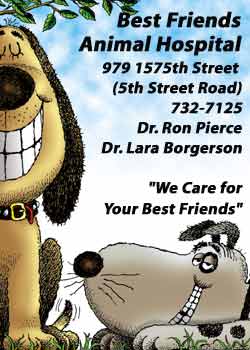|
First,
be honest with yourself about how much time and money you have
available to devote to a puppy or a dog. Then, do some research
— on the Internet, in books and with breeders — to find a
breed which will suit your situation. Breeds of dogs differ in the
amount of exercise and grooming they require. Some breeds are
highly independent and stubborn, while others are more readily
"trainable." Some breeds require a lot of activity and
stimulation to keep them entertained and out of trouble! And, of
course, some breeds grow much larger than others and require a lot
of space.
If
there are children in your family, that too must be considered.
Some breeds are known to be good with children, while other breeds
tend to be more "high strung" and are not a good mix in
families with small children.

Don't
forget about the financial commitments either. Quality food,
veterinary care, routine vaccinations, licensing fees, leashes,
crates and/or kennels, toys and chewies, and grooming supplies can
add up. There is no such thing as a "free" dog!
With
a puppy, training and housebreaking can (and should) be
time-consuming activities. There will be puppy-related
wear-and-tear on your house. There will be accidents, as
housebreaking won't happen overnight. A puppy must be properly
socialized and trained in order to be a well-mannered member of
your household. Remember that a majority of dogs wind up in
shelters or abandoned NOT because they "bad dogs" —
they wind up there because their owners either didn't take the
time to train them properly or got tired of the responsibility.
Make sure this isn't going to be you!

[Rollie is a 2-year-old adoptee owned
by Cherie Rankin.]
If
the responsibility of a puppy sounds like more than you want to
take on, there are other options. Animal shelters and breed rescue
operations have countless dogs available that need loving,
responsible homes. With a little time and research, you can find a
dog of almost any breed or mix that is available for adoption.

Of
course, with an older dog, there may be other issues to consider.
An older dog may have special health needs. In this case, be sure
that you are able and willing to meet them, both emotionally and
financially. Potential owners are often afraid of adopting an
older dog. These people might be pleasantly surprised! Older dogs
are often calmer than their younger counterparts, demand less
exercise and may already be well-trained. And as veterinary care
technology advances, the life span of our canine companions keeps
increasing. An older dog may, in all likelihood, have years of
love and companionship to offer you.
[to
top of second column in this article] |

Do
your homework! In her online article "Choosing the Right
Dog," Sari B. Tietjen makes the following suggestions.
—
There is no substitute for making a careful study of each breed's
characteristics and narrowing down the field until you are left
with the one that best suits your temperament, lifestyle,
accommodations and taste.
—
Go to a dog show, buy dog books, consult websites and search out
legitimate kennels. Talk to breeders and other experts about the
breed you are considering.
If
you decide a puppy is what you want, find a breeder who will work
with you and answer your questions. DO NOT buy from pet stores or
wholesalers. Ask to see the puppies' parents. Make sure that the
parents are certified for hip and eye health and that they have
good temperament. Pick a puppy who appears healthy and whose
temperament seems well-adjusted. Then take it home and be a
responsible owner!

If
you decide that you would prefer an older dog, locate the breed
rescue group for the breed you desire, or check your local animal
shelter for a dog that suits you. Quality rescue and shelter
organizations are more than willing to work with potential owners,
as their top priority is finding good homes for the animals in
their care!
There
is a wealth of information available to you to help in your search
for the perfect canine companion. Good breeders are more than
happy to talk to you about their breed. Books on specific breeds,
their characteristics and the commitment required of an owner
abound. And, of course, the Internet has some wonderful sites. Two
excellent sites are:
Dog
Owner's Guide — The Online Magazine for Pet and Showdog Owners,
at http://www.canismajor.com/dog/chbreed.html
The
American Kennel Club website, at http://www.akc.org
(The
AKC site has links for both breeder referral and breed-specific
rescue contacts.)
If
you invest the time in finding the perfect canine match, your dog
will reward you with years of loyal companionship, countless happy
memories and unconditional love. Happy searching!
[Cherie
Rankin]

|

